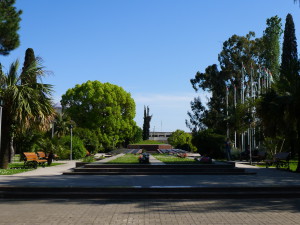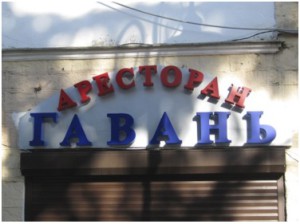Mother tongue issues in Abkhazia
17:45, June 15, 2017 | News, Own news “Abkhazian is the official language of the Republic of Abkhazia. […] Along with Abkhazian, Russian is considered the language of public and other institutions.” This is how the Constitution of the Republic of Abkhazia defines the role of Abkhazian as the official language (Article 6).
“Abkhazian is the official language of the Republic of Abkhazia. […] Along with Abkhazian, Russian is considered the language of public and other institutions.” This is how the Constitution of the Republic of Abkhazia defines the role of Abkhazian as the official language (Article 6).
In its turn, the Law on the Abkhazian Language adopted in 2007 by the Parliament of the Republic of Abkhazia, strengthens the role of Abkhazian and declares compulsory its knowledge and application for all citizens of Abkhazia. Moreover, the Law clearly emphasizes that the public officials must master and apply it. The Law was to fully take effect starting from 2015.
Thus, the Law on the Abkhazian Language should have already become fully effective; the public officials should have already mastered Abkhazian, it should have become the language of communication at the institutions and the state should have taken efforts to organize education and training in the county in Abkhazian language.
But all this should have been done by law….

Liana Kvarchelia
Representatives of the NGOs in Abkhazian capital Sukhumi insist that there were no accurate estimations; when passing the Law, the lawmakers did not take into account the difficulties of the language and the low level of its application by the population. Also, the state has no necessary resources to organize education fully in Abkhazian.
In her interview, Liana Kvarchelia, Sokhumi-based Board member of the Sukhumi-based ‘Center for Humanitarian Programs’ NGO, expressed her concerns: “The Abkhazian language fell victim to repression”, and provided a historical overview of the trials it passed through.
“My mother did her studies at school in Abkhazian, but when she was already leaving school, the education was already provided in Georgian, a language she did not speak at all”, noted L. Kvarchelia when referring to the status of Abkhazian after 1931 (in 1931, by Stalin’s order Abkhazia became a part of Georgia as an autonomous republic and Abkhazian was prohibited for some time).
Today, Sukhumi-based schools with in-depth study of Abkhazian offer education in Abkhazian till the 4th form, students of higher forms study the Abkhazian language and literature as a separate subject and their education is organized in Russian.
“Enormous amounts of money are needed to transform the textbooks and involve Abkhazian-speaking teachers”, continued L. Kvarchelia and added, “Of course, some steps are taken, we have an Abkhazian Development Foundation, some children’s books, cartoons and movies were reproduced in Abkhazian, but there are no sufficient resources for educational programs.”
The NGO representatives share this opinion: “We need a systematic approach; it’s quite difficult to compete with Russian, today it’s very widespread in Abkhazia.”

Georgian-Abkhazian border. Inguri
Today, Abkhazian is spoken mostly in rural areas; only half of the Abkhazian families settled in urban areas speak Abkhazian, many of them prefer taking their children to Russian schools and kindergartens. They justify it by saying that “The Russian influence is too big” and add: “The Abkhazian alphabet does not even fully reflect the structure of the language, most Abkhazians have difficulties pronouncing some sounds.” They realize that the language is lost but insist that this is caused by the historic circumstances, constant wars and unstable political situation.
Most young people do speak Abkhazian but find it difficult to speak and write grammatically correct. “We want to be known and accepted but cannot even speak our own language,” said with concern one of the young people who refused to introduce himself (they were not too willing to do so).
It is noteworthy that today many Abkhazian words are forgotten for not being applied and to ‘translate’ them into Abkhazian, simply ‘A’ is added as it is the most common sound in Abkhazian.
Professional philologist and historian Madonna Brandzia who teaches Abkhazian at school notes frustrated: “Parents do not speak Abkhazian at home thinking that their children will learn it at school; they study with tutors all the subjects but Abkhazian.” “Speaking Russian is fashionable” she says and adds as if to correct her own words: “Well, Abkhazian is a difficult language, its terminology is especially problematic.” Anyway, in response to our question, she says: “The problem lies in us, we need tougher laws.”
Author: Narine Yeganyan
Photos by: Ani Ghambaryan
The Article was prepared within the 2-week research visit to Abkhazia and Georgia entitled ‘Youth Minorities in Everyday Reality’ organized by ‘NESEHNUTÍ’ Independent Social Ecological Movement based in the Czech Republic with the support of the Erasmus+ programme of the European Union.


